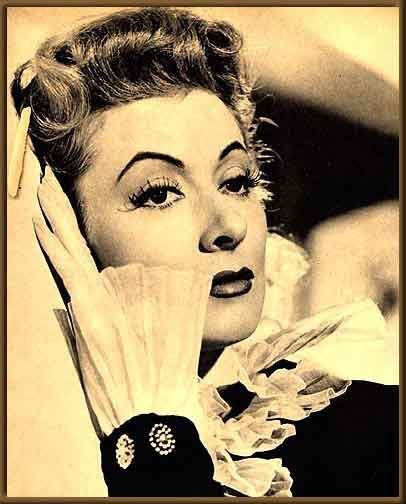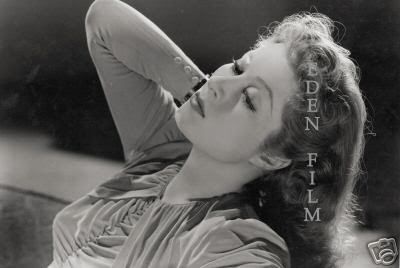Post by Miss Retro on Oct 4, 2007 12:38:07 GMT -5

Greer Garson's first year in Hollywood was a major disappointment for her. She was hoping to begin work right away but soon found that she had much time on her hands. Louis B. Mayer did not have any projects readily available for her and secretly he was unsure of how to cast her. Another major deterrent was Greer's refusal to play supporting roles. She felt that she had been shipped over from England to play starring roles and she was adamant that she did so. She was finally given the leading role in the film Dramatic School but a horse riding accident hurt her spinal column which had already been damaged in a diving accident as a child. Luise Rainer got the part and Greer found herself idle once again.
Greer was about to give up hope when she was offered the part of Mrs. Chips in Goodbye Mr. Chips, based on James Hilton's short story about a beloved school master. She was disappointed when she read the script because her part was rather small but she was afraid that her refusal to do it could jeopardize her already stagnant career and she was tired of doing nothing. The film was made in England and included a British cast including Robert Donat, who played Mr. Chips. Greer did not think much of her role and felt that it would probably be the only film she would ever do. She was already planning on returning to England and resuming her stage work when Goodbye Mr. Chips was released to glowing reviews and critical acclaim for her work.
Accolades continued during the coming months and not many people were surprised when Greer Garson was nominated for the Academy Award for Best Actress. It was a high honor especially considering that her part was really a supporting role. Robert Donat won the Best Actor award but Greer lost to Vivien Leigh for Gone With The Wind.
Louis B. Mayer knew he had a star and she was arriving at a great time. Both of MGM's most prestigious actresses, Greta Garbo and Norma Shearer were retiring. Greer was next cast in a fluffy comedy called Remember? while Mayer searched for quality roles for his new leading lady.
Pride and Prejudice proved to be just that with Greer cast as Elizabeth Bennet and Laurence Olivier as Darcy. She was ideally cast despite being 36 and playing a 20 year old girl and the film did very well at the box office. Greer was next cast in Blossoms In The Dust which was based on the life of Edna Gladney, who founded an orphanage in Fort Worth, Texas. It was filmed in Technicolor and audiences had their first chance to see Greer's flaming red hair. Walter Pidgeon was cast opposite her and their pairing would be repeated numerous times in the future. Blossoms would garner Greer her second Oscar nomination.
The public loved Greer Garson and part of her success was due to good timing. World War II was spreading throughout the world and the unease felt by many was lifted by the persona of this beautiful woman who projected solace in her acting and friendliness in her off screen personality. No role would enhance this quality more than Mrs. Miniver. her sixth film at MGM.
Producer Sidney Franklin had wanted to make Mrs. Miniver for several years. It was based on the book by Jan Struthers and dealt with a typical English family and how their lives are affected by the war. Greer was not very enthusiastic about the role mainly because Kay Miniver had a college age son but Franklin and Mayer insisted that only she could play the part. Walter Pidgeon was cast as Mr. Miniver and the cast also included Teresa Wright, Dame May Whitty, Reginald Owen, and twenty three year old Richard Ney who played Vin, the older son.
Mrs. Miniver was released in the summer of 1942 and caused a sensation. It broke box office records across the country and Greer Garson was universally praised for her performance. President Roosevelt and Winston Churchill lauded the film as an excellent morale booster and urged the public to see it. It would receive 12 Academy Award nominations and would win Best Picture, Actress (Garson), Supporting Actress (Wright), Director (William Wyler), Screenplay, and Cinematography. Greer Garson's 5 1/2 minute Academy Award acceptance speech became legend and was talked and joked about for years to come.
[/center]Greer was about to give up hope when she was offered the part of Mrs. Chips in Goodbye Mr. Chips, based on James Hilton's short story about a beloved school master. She was disappointed when she read the script because her part was rather small but she was afraid that her refusal to do it could jeopardize her already stagnant career and she was tired of doing nothing. The film was made in England and included a British cast including Robert Donat, who played Mr. Chips. Greer did not think much of her role and felt that it would probably be the only film she would ever do. She was already planning on returning to England and resuming her stage work when Goodbye Mr. Chips was released to glowing reviews and critical acclaim for her work.
Accolades continued during the coming months and not many people were surprised when Greer Garson was nominated for the Academy Award for Best Actress. It was a high honor especially considering that her part was really a supporting role. Robert Donat won the Best Actor award but Greer lost to Vivien Leigh for Gone With The Wind.
Louis B. Mayer knew he had a star and she was arriving at a great time. Both of MGM's most prestigious actresses, Greta Garbo and Norma Shearer were retiring. Greer was next cast in a fluffy comedy called Remember? while Mayer searched for quality roles for his new leading lady.
Pride and Prejudice proved to be just that with Greer cast as Elizabeth Bennet and Laurence Olivier as Darcy. She was ideally cast despite being 36 and playing a 20 year old girl and the film did very well at the box office. Greer was next cast in Blossoms In The Dust which was based on the life of Edna Gladney, who founded an orphanage in Fort Worth, Texas. It was filmed in Technicolor and audiences had their first chance to see Greer's flaming red hair. Walter Pidgeon was cast opposite her and their pairing would be repeated numerous times in the future. Blossoms would garner Greer her second Oscar nomination.
The public loved Greer Garson and part of her success was due to good timing. World War II was spreading throughout the world and the unease felt by many was lifted by the persona of this beautiful woman who projected solace in her acting and friendliness in her off screen personality. No role would enhance this quality more than Mrs. Miniver. her sixth film at MGM.
Producer Sidney Franklin had wanted to make Mrs. Miniver for several years. It was based on the book by Jan Struthers and dealt with a typical English family and how their lives are affected by the war. Greer was not very enthusiastic about the role mainly because Kay Miniver had a college age son but Franklin and Mayer insisted that only she could play the part. Walter Pidgeon was cast as Mr. Miniver and the cast also included Teresa Wright, Dame May Whitty, Reginald Owen, and twenty three year old Richard Ney who played Vin, the older son.
Mrs. Miniver was released in the summer of 1942 and caused a sensation. It broke box office records across the country and Greer Garson was universally praised for her performance. President Roosevelt and Winston Churchill lauded the film as an excellent morale booster and urged the public to see it. It would receive 12 Academy Award nominations and would win Best Picture, Actress (Garson), Supporting Actress (Wright), Director (William Wyler), Screenplay, and Cinematography. Greer Garson's 5 1/2 minute Academy Award acceptance speech became legend and was talked and joked about for years to come.

Greer's personal life made headlines when she began to date Richard Ney, the actor who played her son in Mrs. Miniver. She was fifteen years his senior and the press had a field day with the story. MGM studio executives were worried that their liaison would hurt the box office performance of Mrs. Miniver (it didn't). They were married in the summer of 1943.
She was now considered MGM's most valuable property and her films were given first rate status. Random Harvest, based on the novel by James Hilton, was Greer's next film and she would always refer to it as her favorite. A romance, it co-starred Ronald Colman, Greer's favorite actor as a child. Colman was a bit long in the tooth to play the leading romantic hero but his performance was outstanding and he would receive an Oscar nomination for it. Greer was excited about the opportunity to portray a contemporary woman and she even got a chance to do a song and dance number and show off her fabulous legs!
She longed to do comedy but the MGM execs felt that she belonged in serious dramas. Madame Curie was next up. The story of Marie and Pierre Curie's discovery of radium was given serious treatment by MGM and wound up garnering seven Oscar nominations (including Greer's fourth for Best Actress, but she would be beat by Jennifer Jones for The Song of Bernadette).
Two more heavy duty dramas followed, Mrs. Parkington and The Valley of Decision, both which gave Greer her fifth and sixth Oscar nominations, respectively. But even critics were complaining that Greer was being used over and over again in the same type of films. The mid forties brought the war to a close and it would also signify changes, not necessarily good, for Greer Garson's career.
[/center]She was now considered MGM's most valuable property and her films were given first rate status. Random Harvest, based on the novel by James Hilton, was Greer's next film and she would always refer to it as her favorite. A romance, it co-starred Ronald Colman, Greer's favorite actor as a child. Colman was a bit long in the tooth to play the leading romantic hero but his performance was outstanding and he would receive an Oscar nomination for it. Greer was excited about the opportunity to portray a contemporary woman and she even got a chance to do a song and dance number and show off her fabulous legs!
She longed to do comedy but the MGM execs felt that she belonged in serious dramas. Madame Curie was next up. The story of Marie and Pierre Curie's discovery of radium was given serious treatment by MGM and wound up garnering seven Oscar nominations (including Greer's fourth for Best Actress, but she would be beat by Jennifer Jones for The Song of Bernadette).
Two more heavy duty dramas followed, Mrs. Parkington and The Valley of Decision, both which gave Greer her fifth and sixth Oscar nominations, respectively. But even critics were complaining that Greer was being used over and over again in the same type of films. The mid forties brought the war to a close and it would also signify changes, not necessarily good, for Greer Garson's career.


